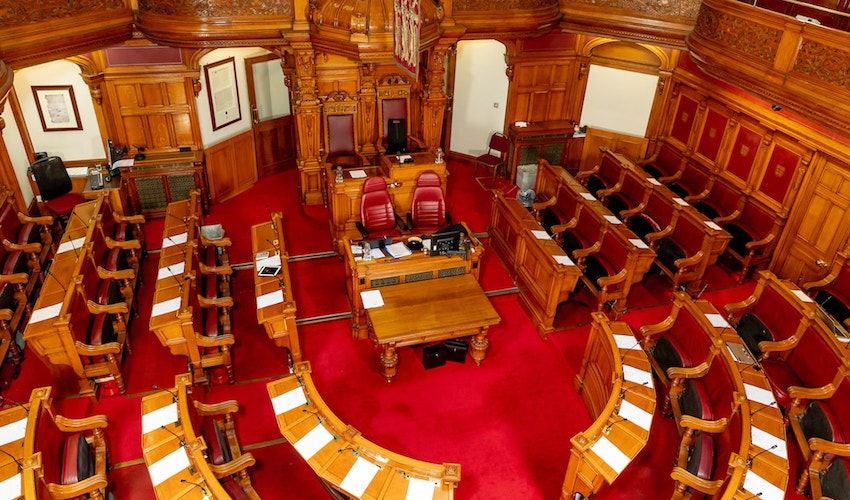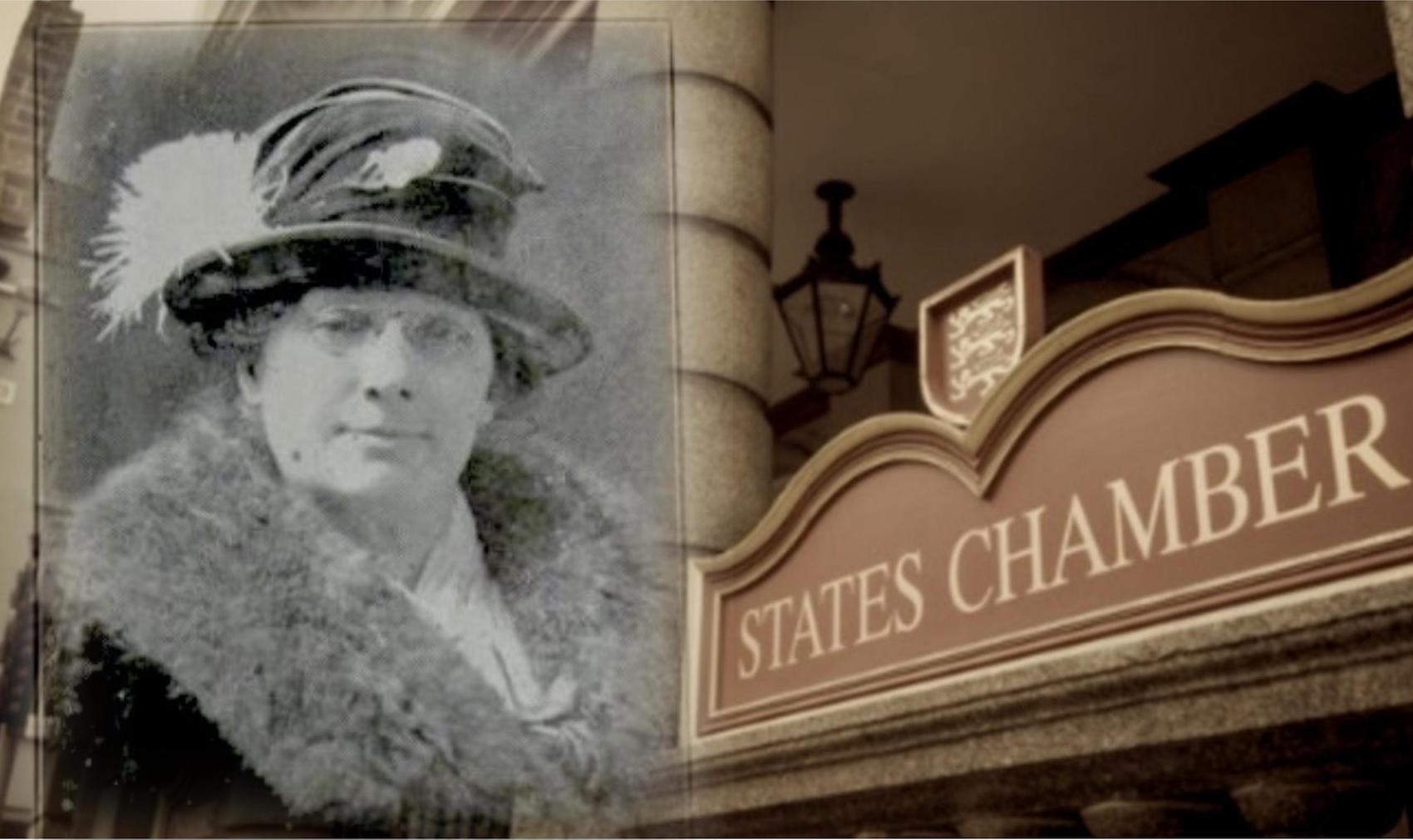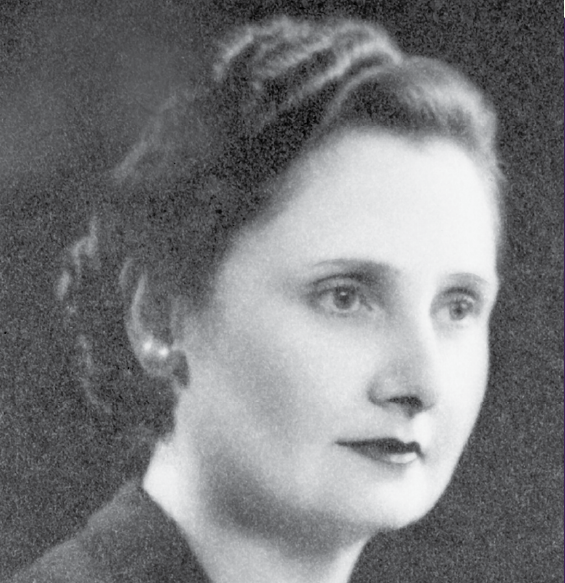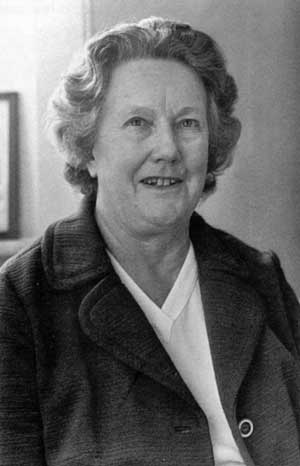


Islanders may be able to watch key States Assembly votes take place live from TV screens broadcasting into the Royal Square in future, and multiple rooms in the building could be renamed to pay tribute to prominent female politicians, if Planning agrees.
The Privileges and Procedures Committee – a panel of politicians responsible for overseeing the running of the States Assembly and making improvements – wants to change the names of four rooms in the Royal Square building to those of female States Members:
Documents submitted to planning explain that each room would feature a name plaque outside alongside an explanatory panel, featuring further information about the individual. They don’t, however, disclose which individuals they are looking to honour.
“The information boards would potentially be A3 or A4-size… and be able to be produced in colour/with photographs, with the aim of being eye-catching for users of the building, including schoolchildren,” the application reads.
It states that each panel would also include a brail translation to comply with disability discrimination regulations.
The suggested name changes follow recommendations from the Diversity Forum, which carried out a ‘States Assembly Gender Audit’.
Before those changes can be made, the Privileges and Procedures Committee will need the approval of the Planning Department, as it relates to changes to a Listed building.
The planning application also includes a request to install TV screens in two windows facing the Royal Square.
“The aim is to display key information, events, updates and live videos and graphics to engage the public and keep islanders informed,” the application reads.
Such graphics may include the Order Paper for States Assembly meetings, livestreams of States Assembly meetings, and calls for islanders to either stand in or cast their vote in elections.
Caroline Trachy broke the mould by being the first Jersey woman to stand for election. Caroline was barred several times from standing due to her being a woman, but through her persistence she eventually got the law changed.
A law was passed in 1924 which then allowed women to stand for the positions of Deputies, but only if they were separated. So when Ms Trachy ran for Deputy again in 1925, she was disqualified by the Royal Court as she wasn't separated.

Pictured: Caroline Trachy.
The law was then changed again which made Ms Trachy an eligible candidate, but she didn't become a Deputy as she ranked last in the polls.
Caroline also founded the ladies’ branch of the Jersey Political Association in October 1918 and, as its first President, wrote an open letter which spoke of women’s role in WW1: “The women in this war have given their dearest and best, who have been taken with or without their consent, and as husbands, sons and brothers, in the sight of God, (if not of man) belong to their womenfolk, then those women in the future have every right to have a voice in the disposal of their dear ones.”
Although Caroline was never elected to the States, she laid the path for Jersey’s first female politician, Ivy Forster.
She was elected as Deputy for St. Helier in 1948, 20 years after the campaign to allow women candidates to stand.

Pictured: Ivy Foster, Jersey's first female politician.
This came just years after she was arrested for sheltering a Russian prisoner-of-war in her attic during the Occupation of the island.
Deputy Forster went onto become the first woman to top the poll when she was re-elected in 1951, but eventually lost her seat in 1954.
Gwyneth Huelin was originally a Deputy for St. Brelade and then St. Saviour, before becoming Jersey’s first female Senator in 1966.
She is perhaps best remembered for her work as President of the Public Health Committee, a position she held for 18 years.

Pictured: Gwyneth Huelin, Jersey's first female Senator, oversaw a £15m redevelopment of Jersey's hospital to address population pressures.
Under her leadership, the General Hospital underwent a £15m modernisation project, which was completed shortly before she retired from the States. The ‘Gwyneth Huelin Wing’ was named in her honour.
She also oversaw the transformation of St. Saviour facilities, having noticed that they were inadequate, over-crowded and offered no privacy to patients.
She was awarded an MBE in the New Year Honours in 1966 and in 1981 she was awarded an OBE in the Queen’s Birthday Honours.
Iris Le Feuvre’s interest in politics was kindled on the bus to school, as she listened in to the conversation of a Constable, Deputy and Jurat would all travel on it on States meeting days.
She originally became a Deputy in 1978, but was later elected Constable in 1984.
During her time as President of the Education Committee, she oversaw the building of the new Haute Vallée School.
Coming from a poorer background herself, she dedicated herself to the alleviation of poverty in the community and looking after vulnerable islanders.
She chaired the Communicare Management Committee, in which she argued in favour of creating a day centre for the elderly.
Even after her retirement, upon which she was awarded an MBE, she continued to be active in the community, heading a group that produced a report on Jersey's ageing population and going on to be appointed to lead the Co-ordinating Committee for the Eradication of Poverty in Jersey.
Comments
Comments on this story express the views of the commentator only, not Bailiwick Publishing. We are unable to guarantee the accuracy of any of those comments.